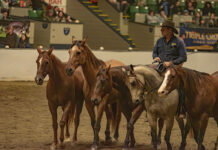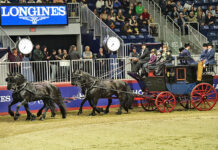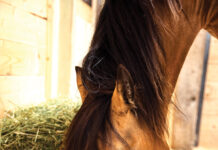
As your horse nuzzles you over the fence, you reflect on how long you’ve had him in your life and start counting back through the years. Although time seems to pass so quickly, you realize that your horse is getting “long in the tooth,” quite literally.
Our horses are living a lot longer these days than in decades past. One of the reasons for this is the availability of improved health care. Nutrition is a key management element in promoting equine longevity. What are some essential factors to consider when feeding your senior horse?
Personalized Plan
An old horse has more exacting dietary requirements than in his younger years, needing higher protein (12 to 16 percent) and fat (7 to 10 percent) in the diet as well as plenty of quality fiber. Commercial feed manufacturers have designed special senior feeds with the aged horse in mind. These products are nutritionally balanced, easy to chew and digest, and appealing in taste.
Body Condition
Learning how to assess your senior horse’s body condition is critical to managing his diet. The senior horse often appears physically different from a mature, robust horse in the prime of life; his back may be somewhat dropped with muscle wasting over the topline and haunches.

Discuss your horse’s body condition with your veterinarian. Do regular checks by feeling for body fat covering your horse’s ribs; you should be able to feel the last two ribs when running your hand lightly across his torso. If you feel more ribs than that, your horse may be too lean; if you can’t feel the ribs at all, then he is likely too fat. Although weight tapes are often inaccurate, they can provide a useful measure of comparison from one time to the next for a particular horse.
Too Skinny
A horse that is too lean may not be consuming enough calories because:
- Not enough food is offered;
- The horse has to compete with others in the herd;
- The horse may be suffering from poor dental condition or a disease;
- The horse may be experiencing a progressive stage of Cushing’s disease.
Due to dental disease and/or hormonal and metabolic changes in physiology as a horse ages, some geriatric horses become picky eaters and turn their noses up at feed products that they used to gobble up eagerly.
An old horse that is not fed enough or is fed an unbalanced diet is more susceptible to infections or anemia, and without a sufficient layer of body fat, is more prone to chilling in winter.

A high-fat dietary supplement (vegetable oil or rice bran) and soaked beet pulp pellets are safe products for adding extra calories for the hard keeper. As much as 1 cup of oil can be fed twice a day once it has been slowly introduced into the diet.
Too Fat
A horse that is too fat is probably receiving more feed than he needs for his activity level. Metabolic disease and/or early stages of Cushing’s disease can also result in obesity.
Confer with your veterinarian about the correct amount and type of feed for your horse. Too much or too rich a diet contributes to obesity and the potential to develop obesity-associated laminitis, while also placing an excess load on aged joints.
A critical element for managing any horse’s diet is to weigh the hay and any other feed components each day. That way you are providing an exact amount according to his needs. Then if it seems he is losing weight or gaining too much, you can make appropriate adjustments.
Food Competition
When a senior horse lives in a herd, it’s important to monitor his activity during feeding times. Some older horses eat slowly and tend to consume small amounts at intervals throughout the day. Old horses tend to tire of eating, leaving their feed to wander off. If such a horse is stabled with greedy eaters, then when the old timer goes back to the feeder, there isn’t anything left to eat. Some seniors may be afflicted by arthritis or eye problems that make it difficult to compete around the feeder.
These horses should be separated during feeding with the food close at hand. This gives them a chance to eat at their own pace without running out of food or having to compete with youngsters. Sometimes it helps to simply put the slow eater into his own paddock during dinnertime and leave him there with free choice forage throughout the night.
Dental Concerns
Not only do older horses’ digestive tracts become less efficient at absorbing nutrients from feed, but dental problems may also contribute to weight loss, even in the face of ample food and a hearty appetite.
You may see balls of feed (“quids”) littered on the ground because of difficulty in chewing. Examine manure regularly for evidence of poorly digested feed particles or excessively wet consistency. Besides contributing to weight loss, a horse that is unable to efficiently grind his feed is at risk of esophageal choke, impaction colic and/or diarrhea, and weight loss.
A horse must chew his food well to derive the most benefit from it. By the time many horses reach their mid to late 20s, little to no tooth length remains. Molar teeth may be worn at various lengths or teeth may have fallen out, leaving a void behind with no grinding surface to prevent the opposing tooth from extending into the space left behind by the lost tooth. The result is a “wave mouth,” which makes it tricky to chew coarser roughage.
Irregular grinding of the jaws due to mouth pain or overgrown teeth encourages the development of sharp points on the tooth edges, with subsequent ulceration of the inside of the cheeks.
Routine tooth floating alleviates these recurring points and mismatches. Schedule visits at least twice a year with a veterinarian who specializes in dentistry.
What to Feed
Horses with a remaining set of useful teeth should be fed high-quality hay that isn’t composed of hard stems. Quality forage delivers more calories and is less likely to be contaminated with dust or mold that could cause respiratory irritation and allergies. Hay cubes provide a relatively dust-free alternative to hay.
Old horses that have worn down or missing teeth will need special attention. Pelleted feed is easier to chew than hay, and senior feeds are formulated with this in mind. Not only do these products break down easily but they are also formulated with high fat for calories and with sufficient protein needed by older horses.
Soaking complete feed pellets, hay cubes, and/or beet pulp pellets in ample water for several hours creates an appealing mash. Extra water obtained this way helps maintain intestinal function and minimizes the risk of choke, especially for an old horse that is unable to chew well and is prone to swallowing an obstructive amount of feed.

Grazing muzzles allow easy-keepers to have plenty of turnout time without consuming too much grass.
Metabolic and Health Concerns
It’s a good idea to have your veterinarian perform a twice-a-year wellness check on your senior horse. A thorough physical exam and blood profiles help to identify beginning problems, such as infection, hormonal imbalances, insulin resistance, Cushing’s disease, and liver or kidney disease before they develop into something serious. Some of these conditions require special diets and could worsen if the horse is fed the wrong type of feed.
For example, a horse with insulin resistance should not be fed sweet feed or pellets containing molasses. Additionally, high levels of calcium, which are found in legume hay or beet pulp products can increase the potential for kidney stones in aged horses.
A horse with liver disease (based on blood chemistries) should not be fed a high-fat or high-protein (soy or legumes) diet.
It’s important to remember that an aged horse’s immune system is not as robust as when he was in his mature teen years. In addition to providing balanced nutrition, daily vitamin C may be a helpful dietary additive.
Appropriate parasite control, fecal testing, and routine immunizations are important elements in improving an older horse’s health status. Combined with a good feeding program and any specifics recommended by your vet, there’s no reason your senior horse can’t live out his years feeling great.
NANCY S. LOVING, DVM, is a performance horse veterinarian based in Boulder, Colo., and is the author of All Horse Systems Go.
This article originally appeared in the December 2015 issue of Horse Illustrated magazine. Click here to subscribe!






Great artical
I am seeing my minature / shetland so skinny started last year and just cant get weight on him . ive had him for 20 years and is possible he is 30 to 35yrs old noew as i was told he was 9 or 10 when i got him . He is also blind . guess i am asking of there is anything else i can do for him besides senior feed .?